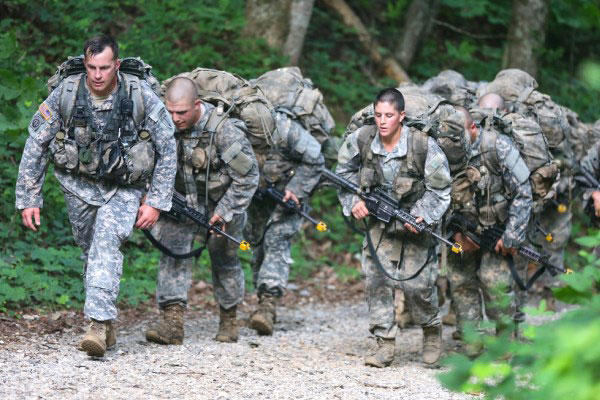The U.S. Army issued a blistering denial late Friday that the recent Ranger school course was “fixed” to allow women to pass and earn the coveted Ranger tab.
In a statement, Brig. Gen. Malcom B. Frost, the Army’s chief of public affairs, said that a People Magazine article charging that Army Capt. Kristen Griest and 1st Lt. Shaye Haver were given special treatment was “flat-out wrong” and “pure fiction.”
The article by Susan Katz Keating was headlined: “Was It Fixed? Army General Told Subordinates: 'A Woman Will Graduate Ranger School,' Sources Say.”
The magazine’s report went on to cite the repercussions of the unnamed general’s influence on subordinates at Fort Benning, Ga., involved in conducting the first Ranger school course open to women that began earlier this year.
‘”It had a ripple effect’" at Fort Benning, where Ranger School is based, says a source with knowledge of events at the sprawling Georgia Army post,” the magazine article said.
"Even though this was supposed to be just an assessment, everyone knew. The results were planned in advance," the article quoted the source as saying.
In his statement for the Army, Frost ran through a list of allegations in the article that he said were untrue.
"The latest attack on the integrity of the United States Army by People magazine's Susan Keating is more than inaccurate, it is pure fiction,” Frost said. “She claimed that women were allowed to repeat a Ranger training class until they passed, while men were held to a strict pass/fail standard. That is false.”
Traditionally, only 25 percent make it through Ranger School without having to recycle, or repeat, one or more phases, according to leaders from the Airborne and Ranger Training Brigade.
“She charged that women regularly practiced on Ranger School's land navigation course while men saw it for the first time when they went to the school. Again, false.”
“She accused an Army general of calling female candidates together to tell them they could not quit the course. Yet again, false.”
In Twitter responses, Keating defended her article and said that “Both Big Army and Benning refused repeated requests to speak to Gen. Miller (Maj. Gen. Scott Miller, commander of the Army’s Maneuver Center of Excellence at Fort Benning.)”
“More importantly, they refused my requests to speak to Ranger Instructors, cadre, and medics alone and without fear of retribution,” Keating said.
Last week, Rep. Steve Russell, R-Okla., a retired Army lieutenant colonel and Ranger qualified veteran of Iraq, requested documentation from Army Secretary John McHugh on whether the two women who passed Ranger school “got special treatment and played by different rules.”
Sue Fulton, one of the first women to graduate from West Point, quickly filed a Freedom of Information request on behalf of a group of women West Point graduates asking to view Russell’s own Ranger school records.
The debate on the Ranger school standards came as the services were to report to the Pentagon by Sept. 30 on whether they would seek “exceptions” for certain billets to the 2013 directive issued by then-Defense Secretary Leon Panetta to open up all Military Occupational Specialties to women who can qualify.
In an op-ed Saturday for the Washington Post under the headline: “Combat-Ready Is Not About Gender,” Navy Secretary Ray Mabus said that MOSs should be open to anyone who can meet the standards, regardless of gender.
He questioned the methodology of Marine Corps studies and tests showing that women were more prone to be injured, and that mixed units failed to perform as well as all-male units.
“Through the extensive work the Corps has done, it is clear that there are justifications for excluding someone who does not meet the standards for a position,” Mabus said. “There are none that justify excluding someone who meets all of the standards because that person is a woman,” he said.
Richard Sisk can be reached at Richard.Sisk@military.com.



























